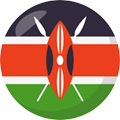Africa Safari Travel - FAQs
Frequently Asked Safari Questions
-
What should I Wear on Safari?Open or Close
CLOTHES: Cotton slacks and shirts are ideal, with a sweater or other layers to shed as the day heats up. A hat with a brim is essential, and a cotton bandanna useful, especially in Amboseli, Kenya, which can be dusty. AfriChoice! will however provide the participants with complimentary safari hats. Khaki and cotton travel well, and pale earth colors such as tan or olive are best for viewing wildlife and birds. Camouflage clothes are illegal in many African countries. Solid-colored safari clothes, however, are practical and widely available; Comfortable walking shoes, such as topsiders or *running/tennis shoes with socks, are recommended over sandals; thorns are everywhere, and socks with your shoes deter mosquito bites. Include a lightweight raincoat or jacket, and a swimsuit (many lodges have pools.) You may want to take flannel pajamas/a robe or a sweat suit for Kenya's Ark, where you can chose to have a wake up call if a rhino comes to the water hole in the wee hours. A nice dress is useful for clubs, casinos and restaurants in Nairobi, where men need to wear a jacket and tie. The Mt. Kenya Safari Club will not seat dinner guests wearing T-shirts, jeans, or running shoes, (or what they call "sports shoes"*). While the Safari Club no longer insists upon a jacket and tie for men, they do enforce a dress code of "Smart Casual." Chinos and khakis work better than jeans, which take forever to try. Safari/Bermuda shorts are unwelcome at mosques; visitors should dress conservatively in Islamic communities (Lamu, Mombasa, Zanzibar;) long sleeves and long pants also deter mosquitoes and sunburn. Laundry service is available at most lodges and even tented camps, but be very clear about when you need your clothes returned. Take at least three changes of clothes for a week on safari, plus your own detergent to wash a few things. Dry cleaners are rarer than rhinos. The best advice is to travel light, and wear cotton.
-
What should I pack for African Safari Travel?Open or Close
Travel lightly. On international flights, each person is allowed a maximum of two pieces of luggage with a combined weight not exceeding 44 pounds in most cases. We recommend two smaller bags rather than one large suitcase. "Squashable" suitcases, Overnight bags, duffel bags, etc. are ideal. While you're on safari, additional baggage can be safely stored at your hotel. The baggage allowance on local planes within East Africa is 33 pounds. Even more important than weight is the size of the bags. Large suitcases cannot be stowed on light aircraft. Again, soft luggage is recommended. A few changes of clothes, your camera equipment, and toiletries are really all you should need. If you plan to do any trekking include a small backpack.
-
Can I bring Electrical Gadgets on Safari?Open or Close
If you bring along video camera, electric iron, razor or hair dryer, make sure they are adaptable to 220 AC and 50-cycle current and that you have adapter plugs for English outlets. Game lodges use generators, which shut down at bedtime. Some camps in Kenya Tanzania only run generators for a few hours per day, however this usually is enough to recharge video batteries. Remember this is wilderness and bush adventure and so don't count on electricity 100% reliability.
-
What Camera should I bring on safari?Open or Close
Africa is the photographer's dream! A camera will record all those, unbelievable and spectacular sights you'll want to share with friends. Any good camera whose features you are familiar with, preferrably a DSLR Camera will do. A camera with video capabilities is also good to capture some moments in motion. Most lodges and camps have facilities for recharging your batteries. You may have to pay a nominal fee in some game parks for non-commercial use of video cameras. Unobstructed pictures can be taken through the roof hatch of your minibus. Remember that any vibration in the camera is magnified, so be sure to rest your arms on the body of the vehicle and request that the engine be turned off, if that's possible. Note: Taking photographs at AIRPORTS, HARBORS, and MILITARY INSTALLATIONS is prohibited. Your entire roll of film may be confiscated. In many tombs, temples or 'closed' museums, you may be asked to pay a fee of $3 for taking photographs, or $30 for use of a video camera. As a protective measure to protect the color of ancient art, some tombs and temples do not allow the use of a flash, or strobe. Here are some points to consider when shoppings for a camera for safari;
1. Durability: Waterproof / Shockproof The best camera for safari will take weather into account. The African grasslands can be a rough place for humans and animals, but it takes an even greater toll on technology. Dust and debris are one of the weather hazards you will encounter on your adventure.
2. Weight and Size When traveling to and around Africa for a safari, there are weight limitations. If taking bushcraft, your suitcase may have to weigh as little as 33 pounds. That doesn’t leave much room for anything extra, especially if you want to bring back souvenirs.
3. Ease of Use: Functionality and Features Not all cameras are equally easy to use. In fact, manual photography settings can take weeks (or even months) to learn properly. Depending upon practice time, you may want to think about investing in one that is easy to use.
4. Lens: Zoom or Wide Angle Lens When choosing the best camera for safari, there are a couple of things to keep in mind. You'll probably be shooting a mix of both animals and landscapes.
5. Frames per Second (FPS) FPS is an important factor to consider when choosing the best camera for safari. The more frames per second, the more pictures your camera takes in one second.
6. Connectivity: WiFi with NFC, and Bluetooth These are some great features for control and file transfer.
7. Battery Life Don't forget to check battery life on specific models. We have many Canon cameras (7 at last count – camcorder, DLSRs and point-and-shoots). A couple of years ago we bought a pair of decent point-and-shoots as backup cameras. As it turned out, that model had a software glitch that gave low-battery warnings whenever shooting video. If we had read the reviews more thoroughly, we would have found this and bought a different model.
8. Sensor Size: Light Sensitivity Chip The camera's sensor is what captures the light and creates a digital image. The sensor is light sensitive and can have a huge influence on the photo quality. That being said, if you have a basic understanding of composition and lighting, you can create great images with any size sensor.
9. Video Recording Ability Some moments on safari require you capture them on video. So, if you do not have a video camera, your digital camera should be able to double up as a camera for still pictures and video. We normally recommend 2 cameras for the professional photographers.
10. Cost If you are going on an African safari, chances are the trip is already a significant investment. We believe that your camera should also be a decent investment.
-
How many memory cards should I bring?Open or Close
Rule #1 - take more than enough! There is no embarrassing moment as running out of camera memory space while on safari! Our advise is that you should take as many good memory cards as possible. Chances are you will fill them up with memories! Take external storage as well if possible to ofload the filled-up memory cards. Having good and ample memory cards provides you with peace of mind so you will always be able to capture the moment and keep it! As a general rule, good memory cards should be; perfect for your point-and-shoot digital cameras and camcorders, should have class 10 speed rating for worry free capture of full HD 1080p video and hi-res images, should have improved reliability and durability for peace of mind, should be able to withstand temperature extremes, x-ray, impact and humidity and fianlly, should have accidental data loss ability with a built-in write-protect switch.
-
Should I bring binoculars on safari?Open or Close
Even though AfriChoice! supplies one or two pairs of binoculars per minibus, your own lightweight binoculars will greatly enhance your viewing pleasure. If you're a "birder", binoculars are essential. The best range of magnification for safari is from 6X to 8X with a lens size of 35mm.
-
Any aadvise regarding jet lag?Open or Close
Try to get as much rest as possible before your flight. Reduce alcohol and caffeine intake as they add to dehydration and adversely affect sleep. Drink plenty of water, especially during and after your flight. Wear loose fitting clothes, comfortable shoes, and try to sleep during the flight. Some people find that an inflatable neck pillow helps them sleep more comfortably. After you nap, walk around the cabin, stretch your legs and move around as much as you can in your seat. Get as much sunlight and exercise as you can upon landing.
-
What is the local currency?Open or Close
The standard unit of currency for Kenya, Tanzania, and Uganda is the shilling, but their values differ greatly, and they are not readily interchangeable. Many local banks can give you current exchange rates. It is not necessary to change money before you leave as there are banks for currency exchange at all international airports and in most hotels. Be sure to save your receipts so you can change any leftover shillings back into dollars before you leave.
-
How much cash should I take on safari?Open or Close
Aside from shopping, you need money for drinks, tips and incidentals. Experience has shown that most clients spend between $400 and $500. The shops are full of tempting items. Major credit cards and travelers checks are accepted in major hotels and stores, but some game lodges and rural shops accept only cash. We also recommend that you take traveler's checks rather than cash with you. Do not keep all valuables in one place, such as a purse, that could be lost. It's a good idea, if you have more than one credit card to keep the second in a separate pocket or locked in the hotel safe. Your airline ticket will be collected by our office upon arrival in Nairobi for reconfirmation of your return flights.
-
How should I tip on safari?Open or Close
Tips for baggage handling and for hotel and lodge personnel are included in your tour price. Tips to driver/guides, tour managers and guides are discretionary, but customary. As a rule of thumb, $70 per day per minibus (shared by the passengers, i.e.$10.00 per day if there are five passengers) for your driver and $10.00 per person per day for the guides is the recommended amount for most tours. At lodges and camps, the recommended tips to driver/guides are $10.00 per person per day and an additional $10.00 per person, per day to be shared among camp personnel.
-
Any medical advise? Prior injections?Open or Close
Generally no inoculations are required for Kenya and only a yellow fever inoculation for Tanzania. HOWEVER, CHECK WITH YOUR PHYSICIAN AS REQUIREMENTS MAY CHANGE. You should carry your health certificate with your passport at all times. Many doctors recommend yellow fever inoculation in all African countries as well as gamma globulin and tetanus. On your safari, you'll be eating and staying at the best places. Your risk of exposure to disease is small. However, any time you travel it is a good idea to be up-to-date on all your routine inoculations. Your doctor can advise you. We do recommend that everyone obtain a prescription for anti-malaria pills. Most types are started two weeks before your arrival and continued for six weeks after your return. The most effective protection against malaria and yellow fever is to avoid mosquito bites. We recommend that wear long sleeves and slacks in the early morning and evening and use a 30% Deet based insect repellent where there are mosquitoes. Most safari lodges in East Africa where there is presence of mosquitoes are equipped with mosquito nets as a standard facility.
-
What about the risk of STDs in Africa?Open or Close
We believe that our travelers are aware of the sources of transmission of AIDS. There is no greater risk of exposure on a safari than there is at home. Mosquitoes do not transmit AIDS. While no one can be certain of the purity of the blood supply at home or abroad, there are blood-screening facilities in Nairobi and in other major cities around Africa. These hospitals are staffed by American and European trained doctors, nurses, and technicians and have high standards of medical care.
-
What is the baggage allowance on safari?Open or Close
You are allowed two normal size pieces of luggage not exceeding 44 lbs. per person on the international flight. However, on chartered aircraft within Africa, the baggage allowance may be 33 lbs, and in small planes, the limit is 26 lbs., including your camera gear. Please read your itinerary carefully and pack accordingly. In many cases you can plan to leave a larger bag behind in the capital or port of entry city, and take only a small duffle bag on safari. In most cases, arrangements have been made for storage of your luggage while on safari, but all baggage is the tour member's responsibility while on tour. If possible, we do recommend baggage insurance.
-
How do I get the best out of safari?Open or Close
Be on time. Nothing is more irritating to other group members than to have to constantly wait for a slowpoke! Be at appointed meeting places, ready to go. You may not wish to go on all game drives or sightseeing. However, do be sure to tell your driver or guide in advance so he won't wait for you. Be quiet. Part of the beauty of the African bush is the silence and serenity. If you notice others aren't speaking, it's probably a sign they wish you weren't either. On game drives you risk scaring away the animal you want to see by shouting or speaking loudly. Quietly point out to the driver the animals in question and be assured he'll respond appropriately. Be considerate. Some in your group may want to keep moving while others want to linger to get that perfect shot. If your group is large, you can often sort yourselves out into minibuses of people with similar habits. Don't assume that you are the only person who likes the front seat. It's always best to ask. Refrain from smoking in vehicles and during meals. Don't be a complainer. Most problems are pretty easy to rectify when the right person knows about them. If something is bothering you tell the person concerned or your guide. You're on the adventure of a lifetime!
-
Any tips on Photography / filming?Open or Close
Africa is a paradise for photography, but do not wait until you arrive to become familiar with new gear. Take equipment that you have used before. While memory cards are available for sale in Africa, they are expensive and limited. Be sure to take along plenty and buy it before you leave home. Take extra batteries for your light meter, and a waterproof pouch (a zip lock bag may do) to protect your camera from moisture and dust. Take extra batteries and plug-in adapters if you plan to use a video camera. At some remote lodges and tented camps, power is produced by generators that are often turned off at night, and the current may not be powerful enough to recharge your batteries. It is smart to take a recharger that works off a vehicle battery, but bear in mind you may not be the only video buff needing a camera charged, and recharging often requires the vehicle engine be on. Larger lithium batteries that you can wear on your belt will last longer. In many tombs, temples or 'closed' museums, you may be asked to pay a fee of $3 for taking photographs, or $30 for use of a video camera. As a protective measure to protect the color of ancient art, some tombs and temples do not allow the use of a flash, or strobe.
-
What abould voltage and power rating?Open or Close
The electric current in Africa is 220-240 AC. Dual voltage appliances may still need an adapter for the plug, usually British-style flat three-prong. See plug in adaptors for the various formats. Some hardware stores sell a multi-functional adaptor that has all the basic plug in prongs.
-
What about visa / immigration procedures?Open or Close
Nowadays, most visas can be applied and obtained online through evisa services. Residents of certain countries can also obtain visas on arrival at their destination. Regarding yor imported equipment, you may bring into East Africa any personal effects, including cameras, and an unlimited amount of memory. Products made from endangered species may not be taken out of the country. Do not be tempted to buy ivory, tortoise shell, or elephant skin products.
-
Which travel documents do I need?Open or Close
In addition to your valid passport, visas are required for Kenya and Tanzania. AfriChoice! will obtain the necessary visas for a small service fee. Application forms and instructions are now available online at Kenya Airways Website including photo requirements for each visa.
-
Do I need cash and how do I get it?Open or Close
Since you will be met upon arrival at the airport and escorted to your hotel, you will not need any local currency before you reach the hotel, where you can obtain it. However, if time permits, airport exchanges often give better rates than hotels. There is now a large number of registered For-Ex Bureaus where you can change your money safely and at excellent rates. Major Credit Cards are often accepted in larger towns and at lodges, but in markets and with vendors along the road, cash works best, and bargaining is expected. We recommend that you take traveler's checks rather than carrying large amounts of cash. Many travelers find it useful to carry a hand calculator to estimate dollar values while shopping. ATM machines are not widespread and may only be found in major capitals; consult your own bank before departure.
-
What if I get sic on safari?Open or Close
In the event of an emergency or sudden sickness while you're on safari in East Africa, we guarantee medical evacuation to a hospital. The medical facilities in Nairobi and other major cisties offer a full staff of professionals along with state-of-the-art testing equipment. We'll pay for the Flying Doctors Society to come to your side. Most hotels and safari lodges you will visit has in-house doctor who will attend to you in case of a need.
-
What will I gain from the African Safari?Open or Close
Remember you are on an African holiday expedition. We understand how valuable your vacation time is. When you entrust that precious time to AfriChoice!, we will help you make the most of every minute. It is our privilege to take you away from the everyday world to contemplate the timeless wonders of Africa. So you'll return from your AfriChoice! safari with much more than memories. You'll return feeling renewed, refreshed, and replenished.
Explore Our Amazing Destinations!
We have the widest range of safari products in East Africa and Beyond.
Affordable, Tailor-Made Safaris Customized to Suit Your Taste and Style.
-

Kenya
KENYA - Traditionally known as the true home of African Safari & Beach Holidays. -

Tanzania
TANZANIA - The land of Kilimanjaro, Serengeti National Park and Zanzibar Islands. -

Uganda
UGANDA - Popular for the Gorilla Tracking Adventures and the source of River Nile. -

Rwanda
RWANDA - Emerging safari destination also know for it Mountain Gorillas and more. 
Indian Ocean
AFRICA ISLANDS - Know for its Turquise Blue waters and the pristine sandy beaches.-

Others
OTHER DESTINATIONS - We also offer trips to holidays to other African countries of interest.



 Paul Kitching - UK
Paul Kitching - UK Karen Howard - CANADA
Karen Howard - CANADA
